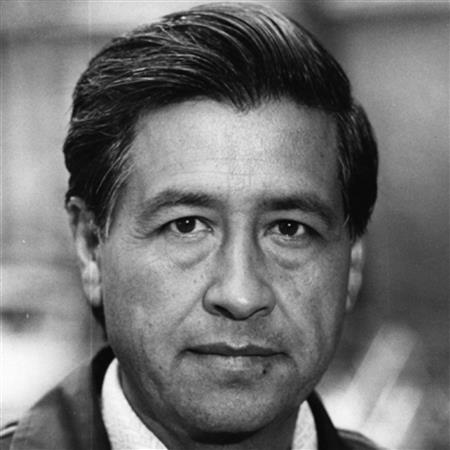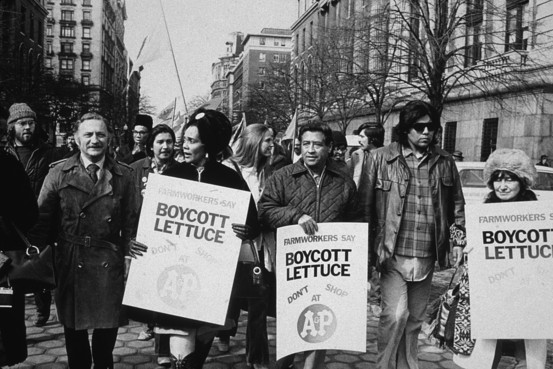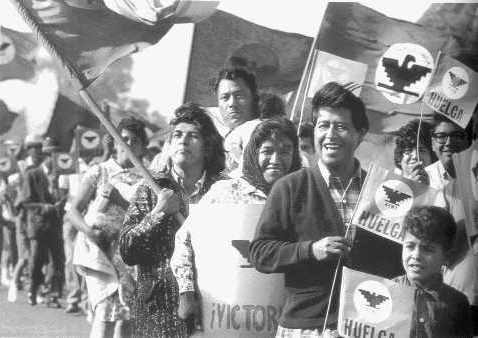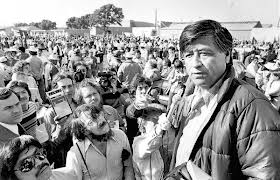 |
| Cesar Chavez (www.biography.com) |
Delano to Sacramento, 33 cities, 8,000 farmers, a 200 plus mile march, putting Cesar Chavez in the history books. Marches were a common activity for Chavez. He was an American icon, who revolutionized the rights for farmers, laborers, and segregated communities. Coming from a family of migrant farm workers, Chavez continuously fought for the rights he never received through various boycotts, strikes, protests, and marches. A hero must possess courage, the ability to always have the strength to battle through the bad times, and persistence, having the drive to fight for your motives/beliefs no matter what setback. Cesar Chavez's courage and persistence to help others, drive to fight for civil rights, and his relentless determination to help farmers and laborers who were stripped of their rights, is what makes him a hero.
 |
| Cesar Chavez leading one of his famous boycotts. (www.keywordsuggests.com) |
Cesar Chavez's courage helped him overcome many obstacles and kept him focused towards being a civil rights activist. Every challenge that came his way, Chavez took it head on, Chavez was an outspoken advocate of social change through nonviolent means. In 1968, to avert violence in the grape strike, he undertook a 25-day fast; the fast was broken at an outdoor Mass attended by some 8,000 persons, including Senator Robert F. Kennedy,"("Cesar Chavez"). Chavez did not eat for 25 days. He put his own health and safety on the line to show people how the rights of farmworkers have been taken. His impact was shown when thousands of people attended a Mass just to watch him break a fast. Being able to pull of those risks just to help farmers get their rights back, shows extreme courage. Many personal issues start at youth, such as segregation, and it progresses to not even being paid reasonably, yet Chavez never let any of this discourage him, "The family experienced all the hardships faced by other Latino migrant laborers. The law offered them no safety or health protections. In 1936, the National Labor Relations Act took effect, but it excluded farmworkers from the protections given to other workers. Paid low wages, hired and fired at the whim of a grower, and desperate to keep starvation at bay, the entire family worked hard without ever making enough money to pay off their debt. Finally, in 1938, they lost their farm. They became like millions of other Latino migrant laborers, traveling up and down California from harvest to harvest without a permanent home"(Hovius). Despite the low pay, having no health protection, and much more, Chavez didn't ever renounce. Instead he courageously used his hardships as motivation to fight for laborers, so that they didn't have to go through the same difficulties. Chavez's courage carried him through the rough patches and discouragement he faced during his life and as a civil rights activist.
 |
| Cesar Chavez marching with protesters. (www.beyondchron.org) |
Chavez didn't back down from a fight, his persistence made him capable to overcome multiple barriers, and continue his fight for farmer and laborer rights. Chavez never let the disapproval of others discourage him, "In 1962 after the CSO turned down his request to organize farmworkers, he resigned and returned to Delano. For the next three years, he crisscrossed the state, talking to farmworkers under the auspices of his new organization, the National Farmworkers Association. Many of them dismissed Chavez's ideas, saying that the growers were too powerful and that anyone caught talking about a union would immediately be fired. But drawing on his CSO experience, Chavez recruited workers by helping them with their legal, housing, and other problems,"(Dreier). Chavez put his hope into the approval to organize farmworkers, and when he was denied, he didn't concede. In lieu, Chavez started his own, new organization, where he recruited farmworkers and started his own revolution. He provided the workers many amenities, and was able to achieve his goals without outside help, or help from the CSO. Whether he was beaten or discouraged in any way from his strikes, Chavez at no time gave in, "From the start, Chavez was determined that the strike would remain nonviolent, no matter what provocation the growers offered. At first, they set up picket lines, shouting "Huelga" (Strike) to discourage workers from going into the fields. The growers, and sometimes the police, would harass and even beat them. But gradually the union began to broaden its base of support. Chavez spoke at local universities and convinced students to donate their lunch money to La causa (the cause). He recruited volunteers from outside the union, particularly civil rights workers who were accustomed to nonviolent protest. He enlisted the support of other unions, asking their workers not to load or ship any grapes. He led striking workers on a grueling 250-mile march, from Delano to the state capitol in Sacramento, to call attention to their demands. He also began his first fast during this time, refusing all food to focus attention on the strike and to reinforce its nonviolent means,"(Cesar Chavez). Chavez and his workers were harassed and hurt during their strikes, but that did not hinder the ultimate goal for civil rights. Without support for their motives, Chavez and his workers only fought harder. Their efforts paid off, and they eventually gained assistance from other unions. With more help, more strikes were held with a greater participation, a bigger impact, and it was always kept nonviolent. No matter what the cost or lack of support, Chavez never let anything shed darkness on his fight for civil rights.
 |
| Cesar Chavez preaching to his supporters. (intothewoodsblogdotcom) |
Chavez's courage and persistence inspired many across the land. His ability to organize marches, strikes, and boycotts, had numerous people follow him to pursue similar motives. Chavez fought for civil rights from experience and he battled for a cause that had hurt many farmers, and laborers. With every downfall, Chavez picked himself up and came back stronger, making people believe and trust him. Not only did he impact farmers, and farmer's rights in California, but he did it nationally, ¨people across North America stopped consuming California table grapes. Farmworkers were sent to New York, Ohio, and Pittsburgh, Pennsylvania, in the East, and Montreal and Toronto in Canada to drum up support for their efforts in California. By 1970, the action paid off, and growers from major corporate ranches eventually signed deals with the union. The success was short-lived, however; by 1973, the major growers refused to renew contracts and attempted to undermine the farmworkers union. Chávez renewed the grape boycott. From 1973 to 1975, an estimated seventeen million Americans took part in boycotting grapes, (Hovius). Chavez's rationale to get back farmer's rights resulted in a nation wide boycott on grapes. This boycott achieved the goal to get ranch owners to renew the farmer's contracts. The contracts may have been "short lived", but that just gave Chavez a reason to retaliate with yet another grape boycott, this time with more participants. Organizing the grape boycott, having it's purpose diminish, and coming back with another boycott, and a greater success, shows Chavez's courage and persistence. All those abilities, and qualities combined make Chavez a hero for people to look up to.
Page created on 5/19/2017 12:00:00 AM
Last edited 5/19/2017 12:00:00 AM
